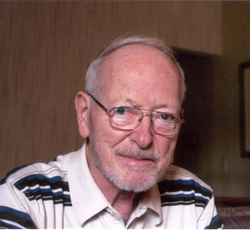 In honor of the College of Medicine’s 125th Anniversary, UNMC Today spoke with some retired faculty members and reflected on their years in the college.
In honor of the College of Medicine’s 125th Anniversary, UNMC Today spoke with some retired faculty members and reflected on their years in the college.
Today we hear from Hobart Wiltse, M.D., a retired professor from the department of pediatrics who spent 37 years on the faculty. He served as professor from 1977 to 2002 and his specialty was taking care of children with metabolic disorders.
The College of Medicine that I knew during my student days in the 1950s had a remarkably small faculty. Few of those faculty members found opportunities for pursuing research careers of their own. I remember most of the professors as being passionately devoted to teaching, particularly in traditional laboratory formats.
By the late 1960s, however, several major factors began to change the nature and style of education at the College of Medicine. First, there was now a growing expectation that the faculty should actively compete for available sources of research funding. There also was a growing understanding that good patient care would have to be an integral part of the educational programs. Expansions of the faculty and diversification of their areas of interest, both clinically and pre-clinically, were natural consequences of these new areas of emphasis. With diversification of faculty came progressive diversification of curriculum and of research focus.
Then, during the 1970s, student numbers were significantly increased, and students themselves took on new characteristics. As the first representatives of the post-World War II crop of baby boomers, these students were remarkably strong willed, determined to take on a good level of responsibility for their own education, and ready to express annoyance if they sensed inefficient use of their available study time and learning opportunities.
Over the next three decades, we have watched progressive expansion of research activity and broadening of our educational missions. We continue to speak of a responsibility for training capable physicians for our own state, but we now also accept responsibility for study and research in almost every aspect of contemporary health care.
My fondest memory consists of watching any student aim high in a career choice and succeed nobly. Sometimes, a student has paid me the ultimate compliment of staking out a career area at least a little similar to my own.
My formative years on the faculty coincided with the era when faculty, curriculum and patient care practices were all actively re-establishing identity and purpose. I found my own pioneering pathway into a specialty area of clinical practice (inherited metabolic disease), which was not previously represented on the local scene. It is now a well-established clinical specialty at UNMC and at Children’s Hospital, preserving my longtime area of interest.
My advice for medical students? I would hope to persuade each student that, in 20 years, he or she will have begun to realize that his or her achievements are more the product of self-education along the way than of knowledge planted by teachers. Master quickly the tools of self-education.